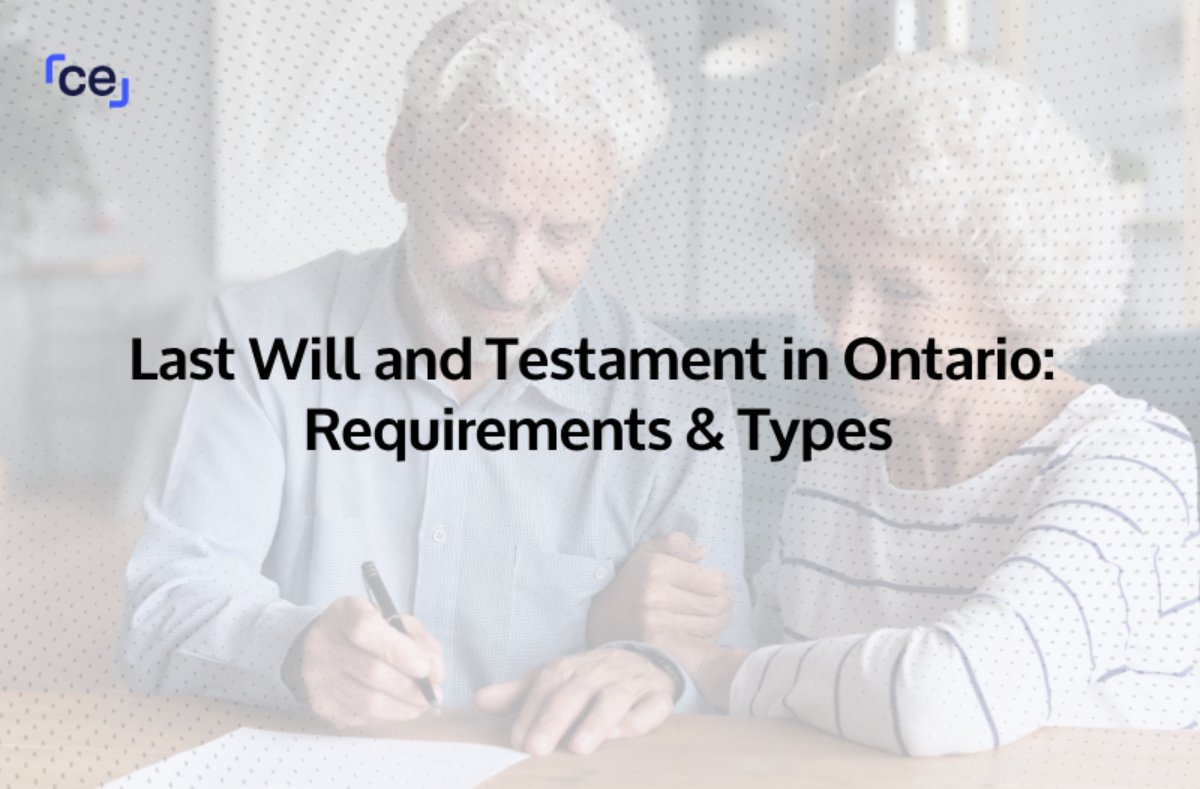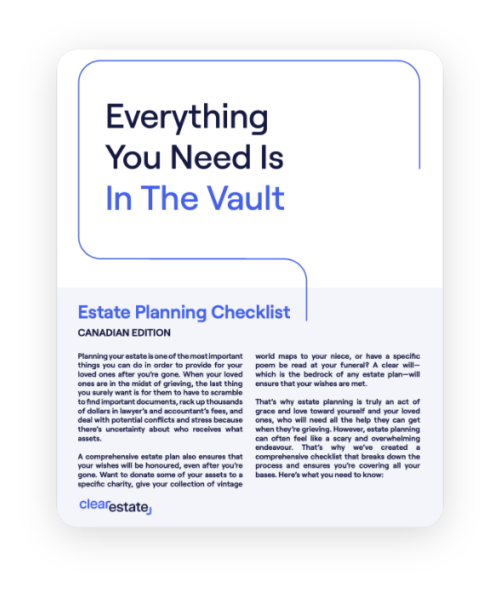Estate Planning
Oct 27, 2025
Introducing Empathy to Estate Bureaucracy
ClearEstate’s origin story: how grief, inefficiency, and compassion inspired Alex to build a fintech that brings empathy and efficiency to estate planning and settlement
Learn about last will and testament in Ontario. Discover 3 types of wills, legal requirements (18+, 2 witnesses), and distribution rules. Free guide included.


A last will is a legally-binding document that allows you to control what happens to your estate and dependents after you die. Your will ideally also names an estate executor, who is the person responsible for carrying out the instructions in the will and for settling your estate. This person should be someone you trust to carry out this responsibility, and the duties of the role should be discussed in advance with the person you select to ensure that they’re prepared.
The will includes provisions detailing care for your dependents, such as young children or adult children with disabilities. A will only comes into effect after you die and it can be changed or updated—in fact, it should!—any time while alive.
You should review your will every few years or whenever there is a significant change in your family situation (e.g. birth, death, marriage, divorce).
If you die without a will in Ontario, the estate is distributed according to the rules of intestacy. Your estate will pass to your surviving spouse, children, parents, or other next of kin in a specific order set out by the law. This is regardless of whether or not you wanted them to inherit your estate.
Creating a last will and testament is the best way to ensure that your estate is distributed according to your wishes. You can also record wishes for pet care, donations to charity, and instructions for funeral arrangements in your will.
To create a legal will in Ontario, you must comply with the following requirements:
You can either handwrite your will (holographic will) or type it and then print and sign it (formal will). Holographic wills do not require witnesses, but formal wills do.
Creating a will does not have to be complicated. Follow these steps to make your will in Ontario:
Need to learn more about writing a valid will in Ontario? Read more about it in our in-depth blog post here.
In response to the COVID-19 pandemic, the Ontario government has allowed for the virtual witnessing of wills. This means that a will can be witnessed via video conference, as long as the following conditions are met:
No, a will does not need to be notarized for legality in Ontario. A will only requires dates and signatures by the testator in the presence of two witnesses, as well as their respective signatures.
Parties involved in a will include:
Understanding the different types of wills available in Ontario can help you choose the best option for your situation:
A formal will, or attested will, is the most common and recommended type of will in Ontario. It must be in writing, signed by the testator at the end, and witnessed by two people who are of full age and not beneficiaries or their spouses. The testator must sign the will in the presence of the two witnesses, and the witnesses must also sign the will in the testator’s presence. This process can now be done virtually in Ontario, provided one of the witnesses is a licensed Ontario lawyer or paralegal.
A holographic will is entirely handwritten by the testator and must be signed and dated. It does not require witnesses or any other formalities. For a holographic will to be valid, it must be wholly in the testator’s handwriting, signed by the testator, and demonstrate a deliberate or fixed and final expression of intention regarding the disposal of property upon death.
While there is no specific legal category for "online wills" in Ontario, using online platforms to create a will can be a convenient and efficient option. These platforms guide users through the process to ensure all legal requirements are met. However, it is crucial to ensure that any online will complies with the legal requirements for formal wills in Ontario, including being signed in the presence of two witnesses and meeting all other formalities.
Each type of will has its own set of advantages and disadvantages. Formal wills are generally recommended due to their clarity and the reduced likelihood of legal disputes. Holographic wills, while convenient in urgent situations, can be more susceptible to challenges. Consulting with an experienced estate planning lawyer can help ensure that the chosen type of will meets all legal standards and aligns with the individual's specific needs and wishes.
Having a will is crucial for ensuring your wishes are respected and your loved ones are cared for. Here are some scenarios where creating a will is highly recommended:
Creating a will provides peace of mind and ensures that your estate is handled according to your intentions. It is a fundamental part of estate planning that helps avoid the complexities and potential conflicts that arise when state intestacy laws apply.
If you pass away without a valid will, known as dying intestate, Ontario's intestacy laws determine how your estate is distributed. Here are the key implications:
Your estate will be distributed to your next of kin according to a predetermined hierarchy set by law. This hierarchy includes:
The absence of a will can lead to delays in settling your estate and increased legal costs. This includes the need for a court application for a Certificate of Appointment of Estate Trustee Without a Will, which can be time-consuming and costly.
Without a will, you cannot designate a guardian for your minor children. The court will appoint a guardian based on the best interests of the child, considering factors such as the relationship between potential guardians and the child, the ability to provide a suitable home environment, and financial resources.
Common-law partners are not automatically entitled to inherit any part of the estate if there is no will. They must prove dependency to receive any support and are not recognized as a "spouse" under intestate succession rules.
Creating a will ensures that your assets are distributed according to your wishes and provides protection and clarity for your loved ones.
At ClearEstate, we help you write a last will and testament that is legally binding in Ontario without the need for a lawyer or notary. If you’re finding yourself in need of help or guidance in drafting your will, don't hesitate to discover our Online Will offering or book a free consultation with our estate planning specialists, today.
1. Can I write my own will in Ontario?
Yes, you can write your own will in Ontario. This can be done through a handwritten (holographic) will or a typed will. However, to ensure the will is legally valid and covers all necessary provisions, it is recommended to consult with a professional or use a reputable online will service.
2. Do I need a lawyer to make a will in Ontario?
While it is not legally required to have a lawyer draft your will, seeking professional guidance can help avoid errors and ensure the will is valid.
3. How much does it cost to make a will in Ontario?
The cost of making a will in Ontario can vary significantly.
4. Can I update my will after it's been written?
Yes, you can and should update your will whenever significant life events occur.
5. What happens if I don't name an executor in my will?
If you don't name an executor, the court will appoint someone to administer your estate.
 Secure Your Legacy
Secure Your Legacy
Get your free 12-step Estate Planning checklist now. 89% of readers complete their estate plan within 3 months of using our guide.
Instantly Access Now